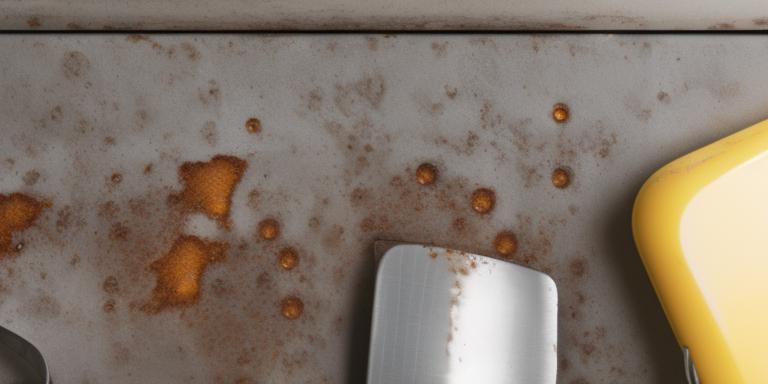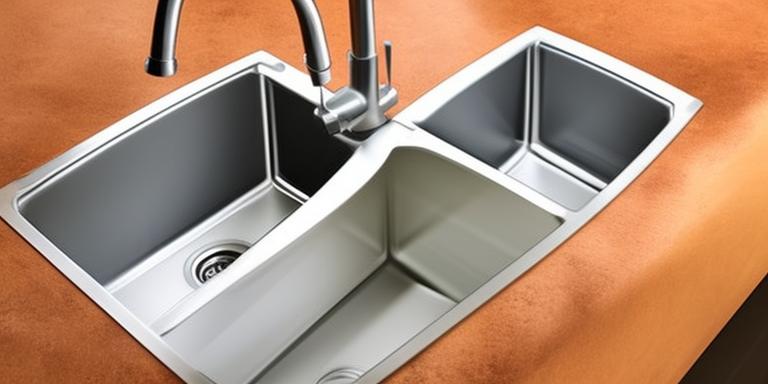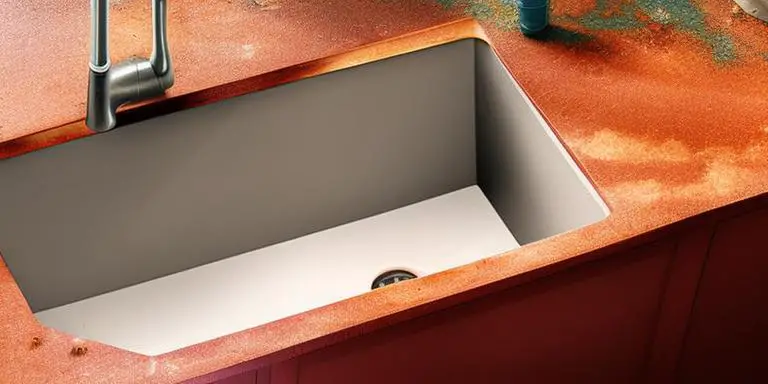How your kitchen looks reflect your sense of mindfulness and beauty. If your kitchen sink has rust, it appears as though it is dirty. Besides, it conveys a message that you are no longer taking care of it. While rust is inevitable, you can eliminate it if you know how to get rust off the kitchen sink. Stay tuned to learn the perfect ways to remove the rust from your kitchen sink.
A Crucial Guide on How to Get Rust Off Kitchen Sink
One of the things that will make you happy is knowing that rust is removable. However, this is only possible if you handle the problem at the right time. When not taken care of at the right time, the truth is that the rust will become permanent over time. And because a kitchen sink is something you pass by daily, address the rust issue immediately you see it building in the sink.
Rust is mainly acute in a stainless steel sink. Gladly, there are different things you can use to remove rust from your kitchen sink. Let’s look at them and how to use them for excellent outcomes.
- Lemon and salt
- Baking soda and vinegar
- Borax and lemon juice
- Store-bought products
- Sandpaper or abrasive pads
Lemon and Salt
These are two common household items you will find in almost every kitchen. This is a good idea if you are wondering what to use to remove rust from your kitchen sink. Below is a discussion on how to use them.
- Wash your sink thoroughly with clean water and dry it.
- Block the drain so that nothing will go down once you apply lime/lemon juice into the sink.
- Disperse enough amount of salt over the affected area.
- Add lemon/lime juice on top of the salt.
- Spread the mixture evenly on the area with rust and leave it at that for several hours.
- Scrub the rust with a microfiber cloth or toothbrush.
- Rinse the rust with clean water.
- Repeat severally to remove the stubborn rust stains.
Baking soda and vinegar
This mixture removes rust from a sink like magic. Use it and be assured of a high success rate. But you must follow the right procedure. Follow the steps below to the end for an excellent outcome.
- Add 2 tablespoons of baking soda to a mixing bowl.
- Gently add a little bit of vinegar to the baking soda.
Note: Too much vinegar can lead to an explosive chemical reaction.
- Mix the ingredients to get a thinner paste than toothpaste and not too watery. Add more baking soda if your mixture seems watery.
- Apply the paste on the rust spots and wait for not less than 10 minutes.
- Rub the paste on the stains with a spoon or fingertips and wait 15 minutes.
- Rinse everything with water and soap.
- Repeat the process to remove the stubborn stains.
Borax and lemon juice
The mixture is a gem once you want to get rid of rust stains from your kitchen sink. For excellent results, use the steps below.
- Mix a half-cup of lemon juice and a half-cup of borax powder evenly.
- Press a sponge gently over the mixture and rub it over the rust stains.
- Rinse out with running water.
- Repeat the process to remove the stubborn stains, if any.
Store-bought products
In the market, there are several commercial cleaners for removing rust. For instance, you can use a porcelain sink cleaner to clean your ceramic sink. While using these products, you must be careful. This is because some are bleaching agents. Thus, using them may cause further damage. Another amazing product you can use to remove rust from your kitchen sink successfully is autosol rust. But remember that they only work if you use them per the manufacturer’s instructions.
Sandpaper or abrasive pads
Abrasive pads and sandpaper work perfectly to remove fresh rust stains. Therefore, if you have just found rust stains in your kitchen sink, use this method to eliminate them. Follow the steps below for excellent outcomes.
- Use 80-120-grit sandpaper for stainless steel sandpaper.
- Dampen the abrasive pads or sandpaper in water and scrub the affected area with the rough side.
- Wash the residues off with water when you are done with scrubbing.
What makes your kitchen rust?

A kitchen sink cannot just rust out of nothing. Several things can lead to this. Knowing them can help you to know how to remove and prevent further rust in your kitchen sink. Below is a discussion concerning them.
- Water supply
Water is a must ingredient for rusting to take place. Not just any water, but the one with minerals that cause rusting process to take place. An excellent example of these minerals is iron. Such water makes your sink have an orange veneer color. In general, iron is not very harmful above the worn look it provides to your fixtures. Nonetheless, you can get a water filter or softener to minimize its concentration.
- Metal cans
When you set these cans in your sink, they will leave orange rings behind. Considering that a kitchen contains these cans, you can thus tell without a doubt that they cause rust on your sink.
- Plumbing issue
If the water heater or pipes are old, the debris and corrosion inside might travel through your system and be deposited in your basin. The stains you see are a result of the sediments in your water.
How To Prevent Your Kitchen Sink From Rusting

Rust is caused by the dissolved iron present in water. When the iron oxidizes and collects on your kitchen sink’s surface, it creates an unsightly orange-red stain. To remove the stain, it is advisable not to use cleansers that have bleach. This is because they are known to worsen the issue. After all, the bleach reacts chemically with the iron and creates more rust.
Gladly, there are several ways you can do to prevent your sink from rusting. They are as follows.
- One of the essential things you can do to prevent your kitchen sink from rusting is to install a water filtration system. This system help removes arsenic, bacteria, organic chemicals, and nitrates from your water. Besides reducing excessive staining on plumbing from mineral deposits, you can be sure to get healthier and good-tasting water.
- Any metallic thing that can rust should be kept in cabinets. This is because they are on the sink, and the moisture makes them rust.
- Looking forward to delaying the look of rust on your kitchen sink? Dry the sink after use. You can do this using a towel cloth. It helps prevent rust particles from settling on the surface of the sink.
- Upgrade your old plumbing with iron pipes. In general, rust deposits can form because of pipe breakdown. Hence, you can prevent this by upgrading the old pipes.
Frequently Asked Questions (FAQs)
Will rust in water harm me?
The truth is that rust in water does not have a health concern, even if you drink it. Nonetheless, it is known to create some disturbances. For instance, it can make your clothes and teeth stain. Furthermore, water with rust has an earthy taste. When used in washing machines and dishwashers, it may create issues in the machines.
What does bleach do to stainless steel?
Bleach can be corrosive in metals like stainless steel. When you bleach your stainless steel items for a long time or repeatedly, chances are higher that it will stain or pit your item.
Can vinegar ruin stainless steel?
You can have your stainless steel sink ruined when exposed for a long time to lemon juice, vinegar, or minerals such as chlorine. Remember, all these things are acidic. Therefore, it is advisable not to leave your stainless steel sink soaked in a solution with substances like bleach, chlorine, or vinegar.
How do you remove stubborn rust stains?
To help remove rust stains from clothes, mix several drops of hydrogen peroxide with a teaspoon of baking soda and tartar cream. Use the outcomes you get to apply on the rust stains. Then, allow it to sit there for 30 minutes. When the times are up, rinse it gently and wash the clothes as usual.
Is baking soda corrosive to stainless steel?
One of the things you use to remove rust stains from your sink is baking soda. Nonetheless, it is not so abrasive to scratch stainless steel. Hence, it is highly used by countless people in kitchens.
Why is my sink rusting?
Most of the stainless sinks do not rust themselves. However, they accumulate rust particles from other metal cookware.
Flatware, metal baking sheets, and iron pans can oxidize in water. When the rust molecule is trapped in the brushed grain of stainless steel, it tends to rust.
Rita C. Donnell (Jennifer) has spent the last 26 years studying and practicing nutrition science. She has used a larger part of this time in improving people’s livelihoods. She has done so by coming up with unquestionable ideas on how to tackle food problems in her community. Readmore


